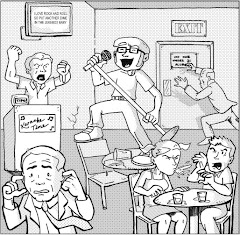The Gunfighters #12, 1963, Super Comics
I never played cowboys and Indians as a kid. Westerns always struck me as too outdated to be fun. I mean, with the whole breadth of history and futuristic science fiction available to the young role player's imagination, why pretend to gunfight in a dusty old road with measly six-shooters? Why not drive an imaginary tank over enemy trenches in World War II or navigate a space class battle craft through mutated alien asteroids? To each his own, I guess. So, as you can imagine, I read this issue of Gunfighters with a reluctant heart. My inner child groaned.
Admittedly, if The Gunfighters wasn't so heavy with the excessive narrative and superfluous dialogue characteristic of its era, I might've enjoyed it more. (The authors and artists are uncreditied, as well.) As is, between the four comic tales and the two-page text short story, most of these yarns were too padded for my taste. Oftentimes I felt like the characters were dragging me through their adventure behind their carriage than inviting me to join them in the dynamics of the frontlines. Further, by the fourth comic strip, the issue seemed to forget its own concept, and none of the characters actually wielded guns during their conflict. Gunfighters and Arrow-slingers would've been a more appropriate title.
Interestingly, two of the strips were told from the Indians' perspective, an element I wouldn't have suspected from these old, usually stereotype-ridden tales. In both of these adventures, the Indians were generally characterized as suspicious and intolerant of "the palefaces," save the one post-modern-minded standout among them whose views were proven right by the end of story. Although I'm sure these tales were written by white men themselves, the idea that such stereotype-driven prejudice between cowboys and Indians was a two-way street is a welcome change from the "white guys as bad guys" trend that permeates most contemporary politically correct works of fiction.
Two of the stories, including the pulpy short detective story, deviated from the cowboys and Indians shtick for a welcome breath of fresh air. The short story featured a predictable murder mystery; it must have been written before red herrings were invented, because the primary suspect is proven guilty by the sheer tone of his shady introduction. Still, I liked the story, as it struck me as a Hardy Boys tale featuring Frank or Joe all grown up. The other comic strip starred a shady entrepreneur bent on establishing a crooked casino in a quiet Western town. Fortunately, an old cowpoke and his donkey expose the fraud and drive the swindler away. With this kind of track record, NBC should consider incorporating a donkey into their Las Vegas series.
The gem of the entire issue is this line of introspection from the young Indian chieftain Wolf Claw, who fancies the same woman as his rival Little Turtle. The squaw's name is what's inspiring:
WOLF CLAW: I would have Pretty Beaver for my own, but she has eyes only for Little Turtle! And by our laws that is her right!
Did I just quote a comic or a porno?
Despite anyone's genre of choice, this challenge proves that everyone's tastes find a common ground in comic books. Unlike the cowboys and the Indians, we don’t have to fight over that territory. The comic book is a fertile land we can all share. So keep that peashooter in its holster, ya varmit.
Monday, August 28, 2006
Subscribe to:
Post Comments (Atom)



No comments:
Post a Comment